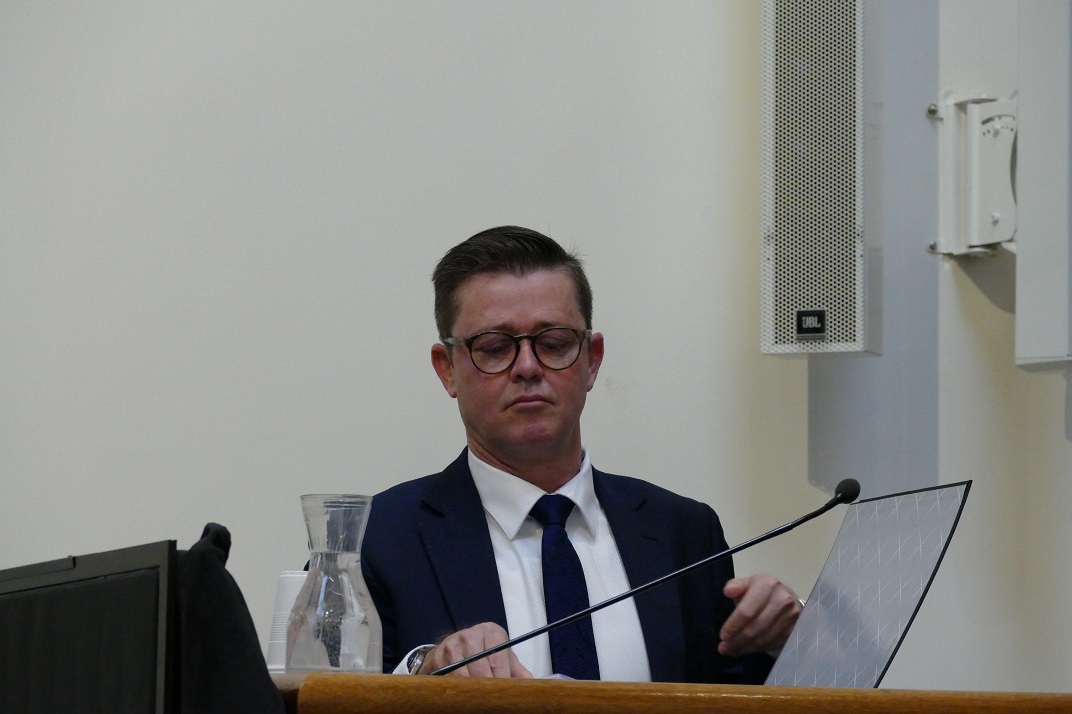
Speaking at the end of the third day of the inquiry at the Dunedin District Court today, Coroner Sue Johnson told the inquest it would form part of the broader inquiry into the death of 26-year-old plumber Rory Nairn.
Mr Nairn died of myocarditis, an inflammation of the heart muscle, on November 17 last year and had not been informed of the potentially fatal issue at the time of his vaccination with the Pfizer vaccine.
He died at the home he shared with fiancee Ashleigh Wilson 12 days after receiving his first dose of the vaccine.
The court heard previously that he had made the impromptu decision to get the jab at a pharmacy after a celebratory breakfast with his partner following the purchase of their dream home.
Today, Coroner Johnson told the court her decision has been reserved and she would be seeking an expert opinion from a cardiologist about the extent to which treatment could have saved Mr Nairn’s life if he had received a diagnosis when he was still alive.
Further evidence would also be sought about what information needed to be brought to the attention of vaccinators, she said.
She concluded the inquest by addressing Ms Wilson, who was the last person to see Mr Nairn alive.
"Rory’s death has not been forgotten," Coroner Johnson said.
Coroner Johnson acknowledged the difficulty Ms Wilson had faced in sitting through the evidence and said the inquiry was focused on how to prevent any similar deaths from happening again in the future.
Before Coroner Johnson’s conclusion, pathologist Dr Noelyn Hung told the inquiry that Mr Nairn’s heart muscle seemed soft and pale, which suggested myocarditis.
She was somewhat familiar with the disease, having encountered it before when working with paediatrics earlier in her career, and about six times in adults over the last decade.
Dr Hung did a full examination of the heart and sent samples off to be tested.

Other parts of Mr Nairn’s body were examined, but the tests showed he was in good health.
"The only thing I found was in the myocardium," she told the court.
While there was no positive test that could show the vaccine was the cause of Mr Nairn’s myocarditis, it was more likely than not the cause of his death, Dr Hung said.
Earlier in the day, the head of Medsafe came under fire over its communications of a rare side effect of the Covid-19 vaccine.
Medsafe group manager Christopher James said the authority first heard of myocarditis being linked to the vaccine in April 2021.
The following month, two more cases were reported and by June it informed healthcare professionals the issue was being investigated and encouraged more reporting.
On July 21, Medsafe issued an alert for the Pfizer vaccine that "healthcare professionals should be alert to the signs and symptoms" of myocarditis and pericarditis, urging anyone experiencing symptoms to seek immediate medical assistance.
Mr James was first questioned by Ben Taylor, counsel for the pharmacy at which Mr Nairn had been inoculated.
He repeatedly suggested there was no explicit instructions for vaccinators to inform people of the potentially fatal side effect as part of the informed-consent process.
Mr James disagreed.
"You would say the meaning was crystal clear . . . you don’t think there could be any confusion?" asked Mr Taylor.
"From a healthcare professional’s perspective, with the experience and training they’ve had, it should be very clear," replied Mr James.
Medsafe, as a medicine regulator, would not have the authority to enforce such a specific direction, he said.

"If it was clear messaging, surely it would be in a different paragraph ahead of the other two," Mr Parker said.
In December, after the death of Mr Nairn, Medsafe told vaccinators they must inform people about myocarditis.
Mr James said they had "upped the ante" on the wording despite not having the power to compel healthcare professionals to provide such advice.
Earlier, Te Whatu Ora Southern’s vaccine rollout programme lead Dr Karl Metzler spoke about an online hub which was used to pass on information to vaccinators.
To suggestions that providers had been drowned in updates, he accepted there was a lot of advice but said he was mindful not to overwhelm them.
Two days after Medsafe’s July 21 alert, the pharmacy at which Mr Nairn was subsequently inoculated completed a "wet run" to test its procedures – and passed.
The court today also heard about a media release issued by the Ministry of Health on August 30 - prompted by the death of a woman - warning clinicians to be aware of the symptoms of myocarditis and pericarditis.
The coroner asked whether that information would have appeared on the hub but Dr Metzler could not be sure.
Last week the inquiry heard from a Ministry of Health manager, Christine Nolan, who confirmed notifications about the risk of myocarditis were sent out from July last year.
A newsletter to vaccinators had also flagged the condition as a rare side effect that was more common in young men.
"I think the communication that came though highlighted that this was a rare and serious risk," she said.
Last week, the person who vaccinated Mr Nairn told the inquest she had not specifically mentioned myocarditis with Mr Nairn because it had not been pharmacy policy at the time.
She said she was aware of the side effect at the time but was unaware it could be fatal.











